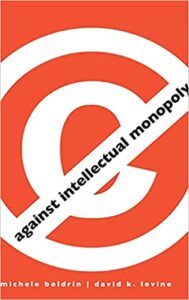The Unseen Costs of Intellectual Property
Arguments in favor of intellectual property (IP) boil down to innovation. If not for giving company X a monopoly on producing good Y, good Y would have never been produced, and we would be worse off; therefore, the government should enforce intellectual “property.”
As persuasive as this may be to laymen, it has a hidden premise; IP provides us with new goods and no relevant cost. There is no sacrifice. The intellectual monopoly will indeed decrease production relative to the free market quantity, but if not for IP protection, there would be no free market quantity in the first place. IP protections are claimed to be a neutral policy; the underproduction relative to an unhampered market is acknowledged, but the market would allegedly not exist if not for the IP protection. It is a win-win!
Admittedly, this situation is conceivable, but the cost of the protection is not simply lower production relative to a competitive market and higher prices, but foregone investment into alternative production is a cost we have no knowledge of.
For example, it may be the case that developing the EpiPen would not happen in a society absent of IP protections; however, this is not a reason to support IP. The choice is not just between EpiPen and no EpiPen, it is between EpiPen and foregone alternative, the unseen.

In this example, if there had been no IP protections, the EpiPen would not have been developed, but the investors and producers would not have gone home and become couch potatoes! The capital invested in EpiPen would have been directed to some other productive endeavor, perhaps the development or production of another drug or in another industry entirely.
That is not something we should lament over. Producing more of another drug is certainly a good thing. If the capital is invested in another industry, it might enable the production of medical devices or food, both also potentially lifesaving.
Even if the alternative investment is not in a “lifesaving” industry, it would be a life-altering industry. All business in the free market aims at the satisfaction of consumer desires. Even if the capital goes into McDonalds or a video game company, the fact remains that this may be the next best alternative investment for the available capital.
Who can say that these investments are not worth it? McDonalds supplies food in foods deserts. Video game companies might produce a game that brings joy to the heart of a kid dying of cancer. Value is subjective. Certain investments will prove satisfying to some, while meaningless to others. The rate of return in terms of money is the only basis for comparing the ability of alternative investments to fulfill the individual desires.

Is all lost? Are we to give up innovation? No; there is plenty of literature explaining how innovation occurs in the absence of IP protections (Against Intellectual Property and Against Intellectual Monopoly).
Non-profits can innovate, too. If a group of people observe that the private sector is innovating inefficiently according to their preferences, they can form or fund a non-profit corporation that engages in research regardless of IP protections.
Furthermore, for-profit companies can take a lot of measures to make sure that their formulas are not copies, such as built-in obsolescence, un-replicability, and non-disclosure agreements.
These are only some ways that companies can protect their formulas. Who is to say that a company will not hire a team of scientists to innovate more in order to stay ahead of competitors? Are we to suspect that pharmaceutical companies will simply give up? Definitely not; they will just adopt a different business model.
There is no way to determine a priori how a company will alter innovation in the absence of IP. Some will not be affected, some will decrease innovation, and some will innovate more. The choice of potential innovators is not always between innovating or not innovating, it is between innovating here, innovating there, or going into some non-innovative yet productive endeavor.
To say that there is an underproduction of innovation at any point is to suggest that there is a better quantity of innovation that exceeds the quantity of innovation desired voluntarily by consumers. If consumers are willing and able to support a higher degree of innovation, someone will find a way to exploit that desire, thus, profiting. The claim states that there is an efficient level of innovation outside of what human actors have voluntarily demonstrated. Efficiency, determined by voluntary actions of human actors, is opposed to the IP.
Ultimately, many, many people are harmed in order to provide protection for someone else’s idea in excess of the free market quantity of protection. Such a thing harms consumers generally instead of enhancing their welfare. That alone is enough to be against IP.
Prioritizing one innovation over another is nothing short of arrogance. It neglects the unseen effects of government intervention and subverts the ability of the market to fulfill consumer desires. All action aims at the satisfaction of human affairs. Choosing not to innovate is a beneficial decision just like any other, and we should not make it a matter of public policy.
Benjamin Seevers is a student at Grove City College studying economics and philosophy.

